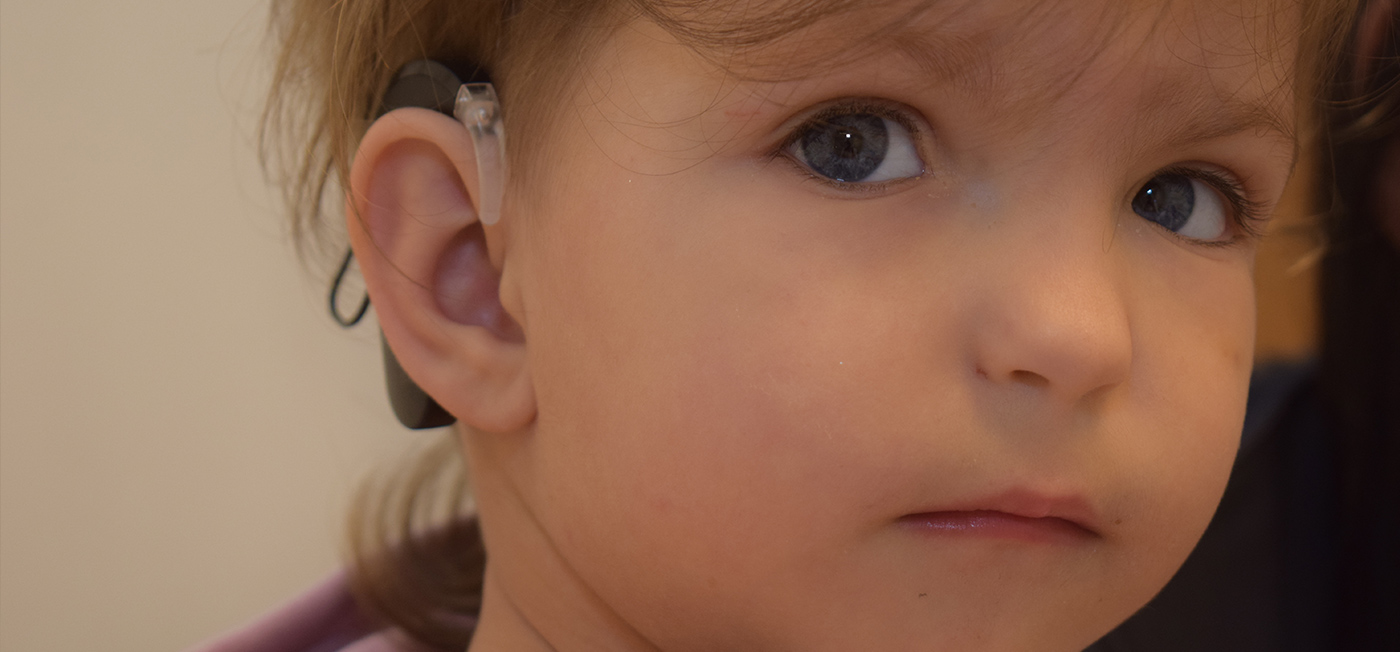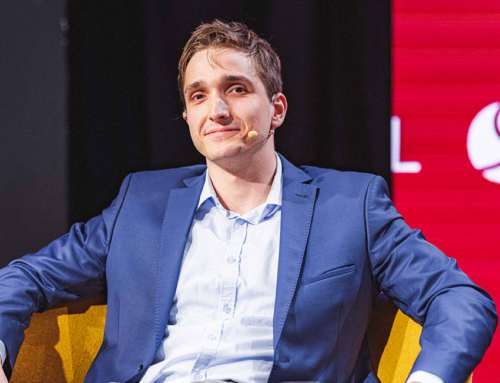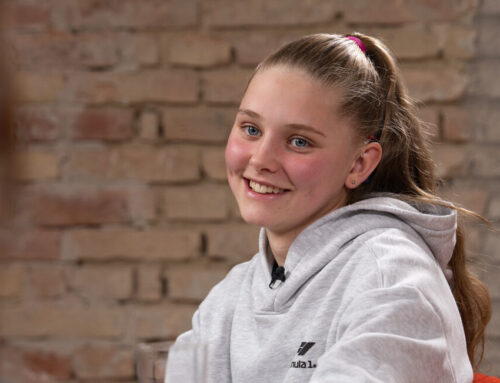Maja can hear again with a cochlear implant!
“At first, we were shocked,” Patrick Beganovic recalls of his daughter Maja’s diagnosis – profound hearing loss. Thanks to cochlear implantation at the Linz University Hospital, the family is now happy to hear Maja’s first words.

Maja’s eyes light up and her gaze sinks into the box full of sweets. The girl, who was born profoundly deaf, adores sweets, especially chocolate. Today, she can have a piece of chocolate as a reward for her cooperation during the hearing tests. The two-and-a-half-year-old has been able to hear with the help of her cochlear implants for the last two months. This also makes her parents’ eyes sparkle: “Maja was way behind in her speech development. Now, you notice every day how that changes!”
Hearing problems in children
Linz University Clinic is the second largest pediatric department and the largest obstetrics department in Austria. The hospital team strives to quickly clarify any diagnosis with hearing impairments. Mag. Sabrina Ackerl emphasizes as a head speech therapist of the ENT department that: “Children born here with a conspicuous newborn screening test of hearing receive a clarified diagnosis by the end of the first month. And they can be fitted with hearing aids right after that.”
“A child with hearing impairment will ultimately have impairments far beyond hearing” Dr. Paul Martin Zwittag, MBA MSc explains. “So, hearing care in children is always an investment in future.” To this day, the head of the ENT department is especially concerned with restoring hearing in both young and old patients. Little Maja will benefit from his many years of experience of the doctor and his team, but her road back to hearing was a bit troublesome.
A chain of unfavorable conditions
Maja was born in April 2019 in Styria and her parents learned about her hearing problems right after birth. Her newborn hearing screening test was conspicuous and follow-up examinations were necessary. After repeating a hearing test due to technical problems there was a talk about profound hearing loss and a possibility of cochlear implantation. However, further examinations were to be made.
Dad took a vacation and took his wife and a child to a clinic. Because of Maja´s age and their distance to home, they wanted to perform the tests in stationary care. However, their reserved bed had to be given to an emergency patient and family had to go back home.
Meanwhile, Maja was 15 months old. Her speech development and behavior were conspicuous to the parents: she could only concentrate for a short time, cried unusually much and communication was only possible through gestures. The parents were becoming insecure, as everything was so difficult at the clinic there. But the family´s move to Upper Austria provided an opportunity to ask for a second opinion on Maja´s hearing at Kepler University Hospital in Linz.
KUK Linz: swift care and open communication!
At the KUK in Linz, all tests were made quickly, and her hearing status was clarified within a week, when they could already try out fitting with hearing aids. They also started with the early intervention program immediately.
“But Maja didn’t show any reactions and we could notice that she is becoming nervous” her father recalls. Speech therapist Ackerl confirms that speech development was triggered with hearing aids, but it didn’t progress accordingly.
With 75 to 80 dB of hearing loss, hearing aids are not always sufficient for an age-appropriate speech development. But cochlear implants can help. “We advised surgery as soon as possible, as Maja had lost so much time,” Ackerl explains.
“At the beginning we were afraid – it always sounds kind of bad when you talk about head surgery” Patrick Beganovic remembers. After numerous talks with the surgeon Zwittag, speech therapist Ackerl and the early intervention team FLIP, as well as with the other parents of implanted children, the parents clarified uncertainties and learned about the potential opportunities.
Cochlear implantation on both ears
During a coffee break at work, Patrick was surprised when his colleague started talking about his bilaterally implanted daughter. The colleague encouraged him: “Don’t worry. Let´s meet and you can see how my daughter´s doing with her CIs.” Encouraged by positive stories and experiences, the parents finally made a decision.
Maja´s threshold was so high on both sides, that hearing aids were not enough and the best decision was to fit both sides with a CI. The speech therapist Ackerl explains the advantages of simultaneous implantation on both sides: “The stimulus then comes from both sides simultaneously. After an implantation with a time delay, the second-supplied ear might even fall behind in hearing development further, but it didn´t necessarily have to be the case.”
Finally, the parents decided to have both sides implanted in Maja at the same time, in one operation. “We did not want to put her through any additional stress with the second surgery.”
Connect with the others
“Maja´s eyes got really big”, the father recalls the first activation of the CI processor. “She immediately looked in the right direction to locate where the sound was coming from, and she never did that with a hearing aid.”
The success proves the parents and the team had right. “Meanwhile, Maja can distinguish sounds from different vehicles on the street. She already understands a lot of things and we do not have to use that many gestures. She is trying to communicate and can already say individual words, such as mom, dad, grandma…” Maja´s behavior also changed: “She doesn´t cry that much anymore, she is not nervous and is much happier!” Her attention has also improved, and she plays with the lady from FLIP team during the whole session.”
Patrick Beganovic explains the first emotions that parents feel when they find out that their child is deaf. “In the beginning, you are just shocked and you don’t want to accept it. But I advise you to communicate a lot with doctors and other professionals. If possible, get to know other parents of CI children”. He recommends everyone to connect with the others in that situation as “You won´t be left alone with your worries!” Maja´s surgeon Zwittag rejoices with the family, “I consider it a great honor as a doctor that I am able to help a deaf or profoundly hard of hearing child with a cochlear implant”






